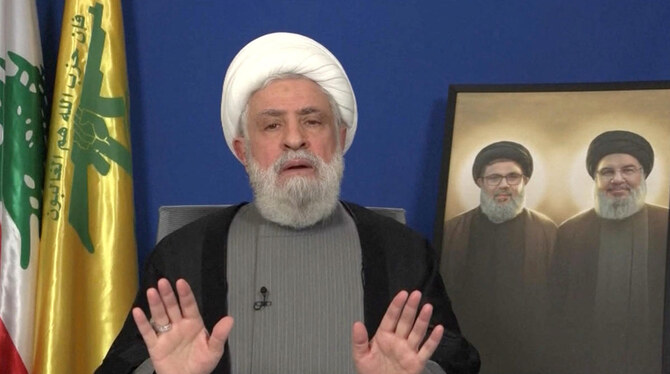ANKARA: Turkish President Recep Tayyip Erdogan has predicted the start of a positive “new period” in relations with Israel when his Israeli counterpart Isaac Herzog visits Turkey next month.
During a televised interview, the Turkish leader announced that Herzog would make the trip to Ankara before mid-February, prompting speculation among analysts that a move on the appointment of ambassadors to both countries could be imminent.
Although precise dates for the visit have not yet been revealed, it will mark the highest-level trip by an Israeli official to Turkey for years when then-Israeli President Shimon Peres visited Ankara on the invitation of then-PM Erdogan.
In his nighttime TV announcement, Erdogan said: “With this visit, a new period can begin in Israel-Turkey relations.”
According to experts, any success in turning a new page in the fragile relationship between the two nations will depend on several factors, including the re-exchanging of envoys, and restrictions on Hamas’ activities in Turkey.
Herzog and Erdogan have spoken three times by phone since July, both passing on friendly messages, and last week Turkish Minister of Foreign Affairs Mevlut Cavusoglu called his Israeli counterpart Yair Lapid, the first time such communication had taken place between the two nations’ foreign ministers in 13 years.
Gallia Lindenstrauss, a senior research fellow at the Institute for National Security Studies in Israel, told Arab News that the appointment of ambassadors would be a concrete first step toward the normalization of Turkish-Israeli relations.
“There is some Israeli concern with the choice of ambassador on the Turkish side, but this is an issue that can be resolved,” she said.
She noted that any significant improvement in the COVID-19 situation could potentially cause friction over the entrance of certain Turkish citizens to Israel.
“Israel might deny entry to those it suspects are contributing to igniting tensions in the West Bank, East Jerusalem, and among Palestinians with Israeli citizenship, and Turkey will likely claim these people are innocent visitors.
“While a report that surfaced this week of Turkish willingness to curb some of Hamas’ orchestrated military activity from its territory is welcomed news in Israel, a negative development in this realm will be an additional cause of friction between Israel and Turkey,” Lindenstrauss added.
To what extent Turkey’s vocal support for the Palestinian cause, including settlements in the West Bank and East Jerusalem, will be reconciled within the rapprochement process is still unknown.
Potential energy projects between the two countries are also on the negotiation table especially after Washington recently decided to withdraw support for the Israeli-Greek East Med pipeline. Following the decision, Erdogan said Turkey was ready to work with Israel on reviving gas transfer to Europe via Turkish soil.
Ankara is eager to diversify its energy resources in the wake of Iran’s sudden move to cut gas flows to Turkey and in the face of a threat to gas imports posed by the ongoing Ukrainian crisis.
“With regard to Turkish statements on renewal of the option of Israel exporting natural gas to Turkey and from there to Europe, it is not clear if developments since 2016 connected to Israel’s gas exports to and through Egypt, as well as recent developments surrounding the Arab pipeline, do not preclude such a pipeline,” Lindenstrauss said.
On the importance of Herzog’s visit, she added: “When Shimon Peres visited Turkey in 2007, he and his Palestinian counterpart, Mahmoud Abbas, gave speeches one after the other in front of the Turkish Parliament. This was the first speech of an Israeli leader in a Muslim-majority country’s parliament.
“Thus, it will be a good reminder that Ankara is capable of playing a more balanced role with regard to the Israeli-Palestinian conflict, and the benefits of such a more dispassionate stance.”
Dr. Selin Nasi, London representative of the Ankara Policy Center and a respected researcher on Turkish Israeli relations, told Arab News that Herzog’s visit would be important for Turkey in overcoming its ongoing diplomatic isolation and improving relations with regional countries.
She said: “An announcement about the appointment of ambassadors may be expected before Herzog’s visit. Actually, it is just a technical detail. Both countries didn’t downgrade their diplomatic relations, they just called back their ambassadors.”
During the upcoming meeting in Ankara, Nasi expected the Palestinian issue, energy, trade, tourism, and regional security, including East Med balances, Syria, Iran, and Libya, to be high on the agenda.
“Ankara would prefer conditioning its rapprochement with Israel with the improvement in living conditions of Palestinian people. At the same time, Israel would expect from Turkey a step forward in terms of Hamas activities in the country,” she added.
Nasi pointed out that Israel had never closed its door to any dialogue opportunity with Turkey. “But its prerequisite is clear: Turkey should stop its support to Hamas. Israel therefore expects clear reassurances from the Turkish side.”
Meanwhile, experts believe that a resolution to the Cyprus issue will be the key to moving forward with any energy project between the two countries.
Nasi said: “The energy topic is preferred by the politicians because it creates a positive agenda in the public opinion of both countries.”
Erdogan is expected to visit the UAE on Feb. 14 as another step toward mending his country’s frayed ties with countries in the region.

























